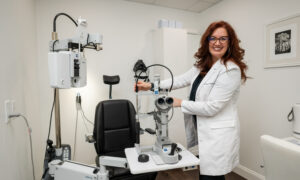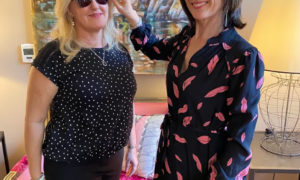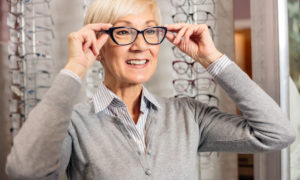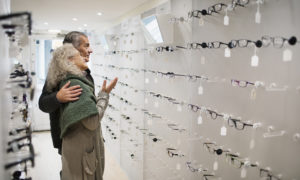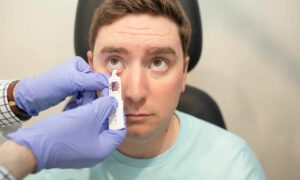By Gina M. Wesley, OD, MS, FAAO 
Selling eyecare accessories, or “extras,” like contact lens cases, eyedrops and neck chains for eyeglasses, provides patients with convenience—and your practice with added revenues. To make it work, meet patient needs, and price fairly.
Patients often have need for eyecare products beyond contact lenses, eyeglasses and sunwear. The question is who will provide it to them? Instead of sending them to a drug store or health specialty store, why not sell these items to patients yourself? You may be surprised at the profitable opportunity that exists to market and sell products such as artificial tears, nutritional supplements, cleaning kits for eyeglasses, repair kits for eyeglasses, eye masks, eyeglass cases, contact lens solution, contact lens cases, fit-over sunglasses and neck chains for eyeglasses.
Sales of all of these products combined brings in an additional $10,000 to $15,000 to my practice annually. And I’m not even a full-time doctor office, so the potential for larger practices is huge. It may not seem like $5 here and $10 there adds up, but it does.
Combination of Exam Chair Prescribing and Right Merchandising
My associate and I recommend products such as artificial tears, solutions and nutritional supplements from the exam room. I write my recommendations on a prescription pad, just like I would for an eyeglasses prescription. My staff showcases and sells the other extra items we sell such as repair kits for eyeglasses and contact lens cases. Many of these items, though, sell themselves simply by being displayed upfront in an area like the reception room. Sometimes they need to be pointed out and explained a little, but how they’re displayed is the primary driver of sales.
Provide Educational Information and Showcase Well
We have information about these products on our web site, but, again, I think the merchandising of the products makes them known. People don’t know what they need from us until we present the options to them and they see the products for themselves. Place the products near the reception area, but not too close, to prevent theft. Make patients aware they are there, but they need to get up and move to the product to see it. Showcase applicable optical products in the optical area, possibly at dispense tables so people have time to view them while waiting for eyeglasses adjustments and fittings. We are always moving products around to see how well they sell in different areas of our office.
We display them on the front desk, in the optical as mentioned above, on the display tables, as well as mixed in with the glasses. We even have a special table that showcases just our nutritional supplements.
Develop Extras Pricing Strategy
We only sell brand name contact lens solutions and mark them up just slightly (less than a dollar) more than mass merchandisers. The patient is essentially paying for the convenience of buying it from us while they are in our office. We price artificial tears based on the manufacturer’s recommendations, and the price of nutritional supplements are set already by the distributor. Other products are marked up at least two times, or what we deem fair for that particular item. We want to profit but we also don’t want to mark it up so high the patient feels like they are getting a bad deal if they buy it from us. It does you no good to have that product there if it doesn’t sell and collects dust.
Explain to Patients Why They Should Buy It From You
Most of the extra products we sell (except for the contact lens solutions) are not available at mass merchandisers. For instance, the artificial tears are a higher quality, physician-only available product. It speaks for itself in performance and feeling, and I let patients know that by sampling it in their eye and prescribing it before they leave. The cleaning kits, contact lens cases and other products are very comparable in price to mass retailers. However, wouldn’t you trust the glasses cleaner your eye doctor recommended more than a similar over-the-counter product at a mass retailer? Would you want to risk scratching your glasses you just paid hundreds of dollars for just to save a buck? Again, with the solutions, if they price shopped, it is slightly cheaper elsewhere but purchasing from us while they are in the office is a convenience.
Recognize Sales Fluctuate
Sales for extra items will fluctuate, but be aware when an item is no longer worth selling. Eye masks (for oil gland blockage) sometimes sell a lot in a month, sometimes none at all. Some “funkier” eyeglass chains haven’t sold, either. In those cases, though, we donate to charity groups or make them part of drawing packages for in-office incentives. My most successful extras have been the artificial tears and the nutritional supplements. We also have the technology to measure absorption levels of the supplements, allowing us to tie the supplements to advanced technology within the office. You don’t have to scan (measure) your levels to buy the supplements, but it’s helpful to validate that it’s being absorbed properly. I invite any reader who has questions about this area to e-mail me directly.
Tie New Extras to Practice Growth Areas
We may begin selling some low vision magnifiers. My new associate, who has a low vision specialty, has worked with these products, and as I expect her to bring more low vision patients into the practice, we are thinking about having some basic low vision magnifier options available.
Sell Eyecare Extras: Three Keys
What do you see your patients buying elsewhere related to eyecare/eyewear that you could sell yourself? Look there first to find ideas.
Let patients know you have these items, both verbally and through merchandising/display.
Have you and your staff use these products, too. Testimonials are key to helping sell in-office products.
Related ROB Articles
Compete with All Retailers for Share of Patient Dollars
Increase Revenue-Per-Exam to $600+
Do a Financial Benchmark Reset: Revenue-Per-Patient
Gina M. Wesley, OD, MS, FAAO, is the owner of Complete Eye Care of Medina in Medina, Minn. To contact her: drwesley@cecofmedina.com.

